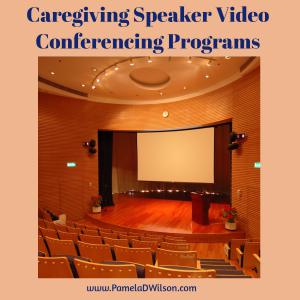Caregiving Programs: The Missing Link in Employee Wellness Programs
Corporations are increasingly aware of the need for caregiving programs to support working caregivers. Learn about programs offered by Pamela D. Wilson here.
GOLDEN, CO, USA, May 6, 2020 /EINPresswire.com/ -- Caregiving expert, Pamela D. Wilson, offers virtual caregiving support solutions, on-site keynotes, and broadcast-quality video conferencing presentations and webinars for corporations. Employee wellness programs seek to increase employee productivity and presenteeism and decrease absenteeism. Many corporate wellness programs are missing caregiving programs to add relevance and increase employee participation.
Behavioral Health Concerns for all Caregivers
Never-ending to-do lists of running errands, attending medical appointments with elderly parents, and providing hands-on care consume up to 20 or more hours a week outside of full-time employment. Most caregivers feel unprepared for the roles and responsibilities associated with being a caregiver. The emotional aspects of caregiving are equally, if not more significant.
Caregivers—especially women—feel guilty about taking time off from caregiving duties for self-care. Family relationships become strained when the primary caregiver assumes the burden of care, and siblings fail to offer support.
Chronic Disease Results in Care Needs of Elderly Parents
When multiple chronic diseases increase the severity of health issues and the frequency of medical appointments, caregivers worry about taking time off work. Anxiety occurs when medical care tasks like special diets, managing blood sugar readings and insulin, and medications become complicated. Worry exists about making mistakes that might harm an elderly parent.
Sleepless nights result from a racing brain worried about health and medical treatments—feeling helpless and hopeless, watching the health declines of an elderly parent. Exhaustion, tension, and frustration affect relationships with spouses, children, elderly parents, and co-workers.
Talking about the stresses of being a caregiver is difficult with others who don’t understand and who may be judgmental. Outsiders looking in say, "caregiving can't be that difficult," when caregivers express frustration or exhaustion. Only another caregiver truly understands the experience.
Caregivers who self-isolate from other family members and friends fall into deep depressions.—others consider suicide. Statistics confirm that caregivers suffer physical and emotional health declines, including earlier incidences of chronic disease, and experience poorer health than the spouse or elderly parent, for whom the caregiver cares.
Caregiving Is a Life Transition
Caregiving is a life transition that touches all lives—eventually. Talking about health issues, sick parents, and death is not a motivational subject. Being a caregiver is motivational from the aspect of witnessing elderly parents suffer, realizing the far-reaching aspects of needing care, and wanting a different life.
Caregivers discover that caring for elderly parents increases awareness of the long term effects of poor lifestyle habits, saving for retirement, and creating a long-term care plan. Adult children with children want to avoid transferring the burden of care down to the next generation.
While many cultures view caring for elderly parents as a responsibility, this does not mean that caregiving is without stress. As in the majority of family situations, one daughter becomes the primary caregiver. If no daughter exists, a son in addition to the healthy spouse becomes the second caregiver. An expectation exists that the caregiving daughter will give up a career when the time and care needs interfere with the responsibilities of a full-time job.
Women Need a Better Plan
According to a Merrill Lynch study, the average woman spends 44% of her adult life out of the workforce compared to 28% for a man. Work disruptions are triggered by the need to care for children, elderly parents, and spouses. Time out of the workforce accumulates into significant financial gaps in retirement savings, and a lack of money to pay for care for the woman who is usually the surviving spouse.
Women need a better long term financial plan if leaving the workforce to be a caregiver is part of a marital agreement. Husbands who usually manage family financial planning must become more aware of the idea of caring for the caregiver. Rarely considered is the answer to "what happens to the surviving spouse when all the family money is spent on care costs for the sick spouse who dies?"
Caregiving Support Solutions Pair With Employee Wellness Programs
Increasing awareness of caregiving responsibilities and supporting working caregivers pairs to increase the success of employee wellness programs. Working caregivers become more aware of the effects of chronic disease as they watch elderly parents struggle with health issues. Participating in caring for elderly parents increases the necessity to learn how to navigate care and work with the medical systems.
Caregiving support solutions offered by Pamela D Wilson offer insights into the stage of caregiving. Corporations can initiate a system of increasing caregiving awareness with online courses and virtual support. Online courses share systems and processes that Wilson used in her care management and fiduciary practice. Wilson’s role as medical power of attorney, guardian, conservator, personal representative, and trustee for her clients provides rare insights and real-life examples that serve as teachable moments.
More information about Wilson’s virtual caregiving support solutions, on-site keynotes, and broadcast-quality video conferencing presentations and webinars for corporations is available on her website at www.PamelaDWilson.com or by calling 303-810-1816.
#
Pamela D. Wilson
Pamela D. Wilson, Inc.
+1 303-810-1816
email us here
Visit us on social media:
Facebook
Twitter
LinkedIn
Caregiving Programs: On-Site, Video Conferencing, Webinars and Courses
Legal Disclaimer:
EIN Presswire provides this news content "as is" without warranty of any kind. We do not accept any responsibility or liability for the accuracy, content, images, videos, licenses, completeness, legality, or reliability of the information contained in this article. If you have any complaints or copyright issues related to this article, kindly contact the author above.



